Sri Lanka Innersearch 2018: Ancient Village
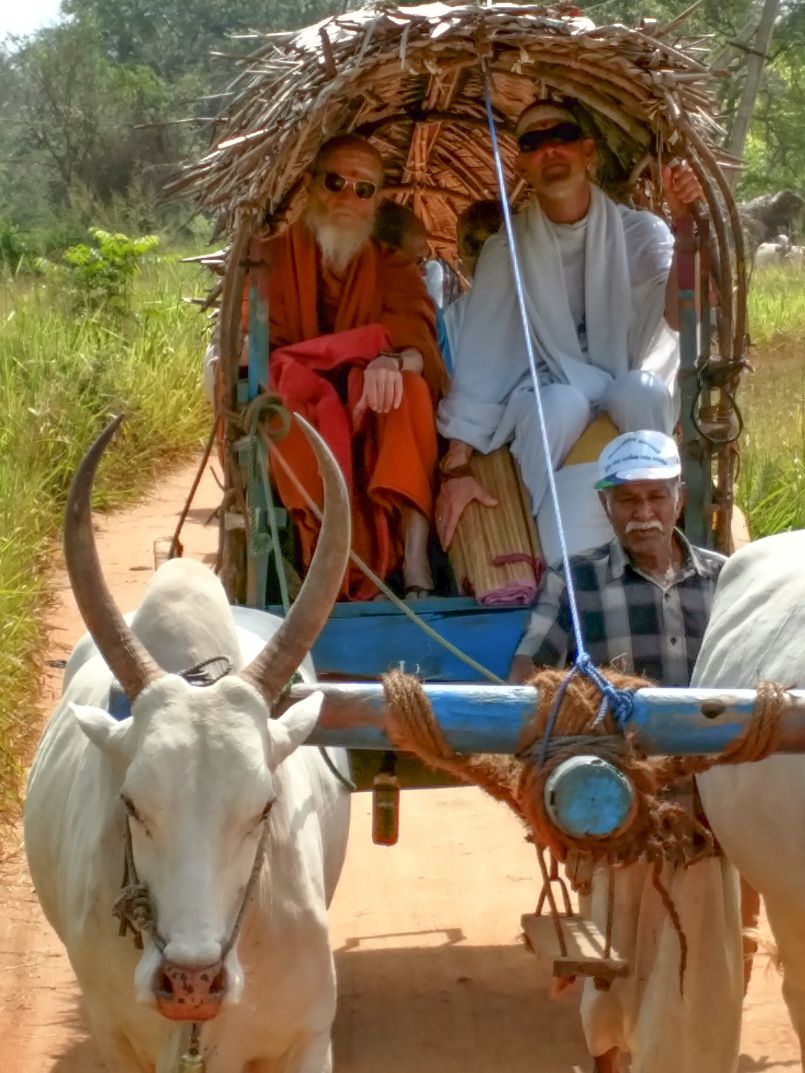
A report from the road:
Aum Sivaya from Sri Lanka!
Today's main activity besides classes was an ancient Sri Lankan village experience. We were transported back 1000 years.
What Is Our Code of Conduct – Yamas
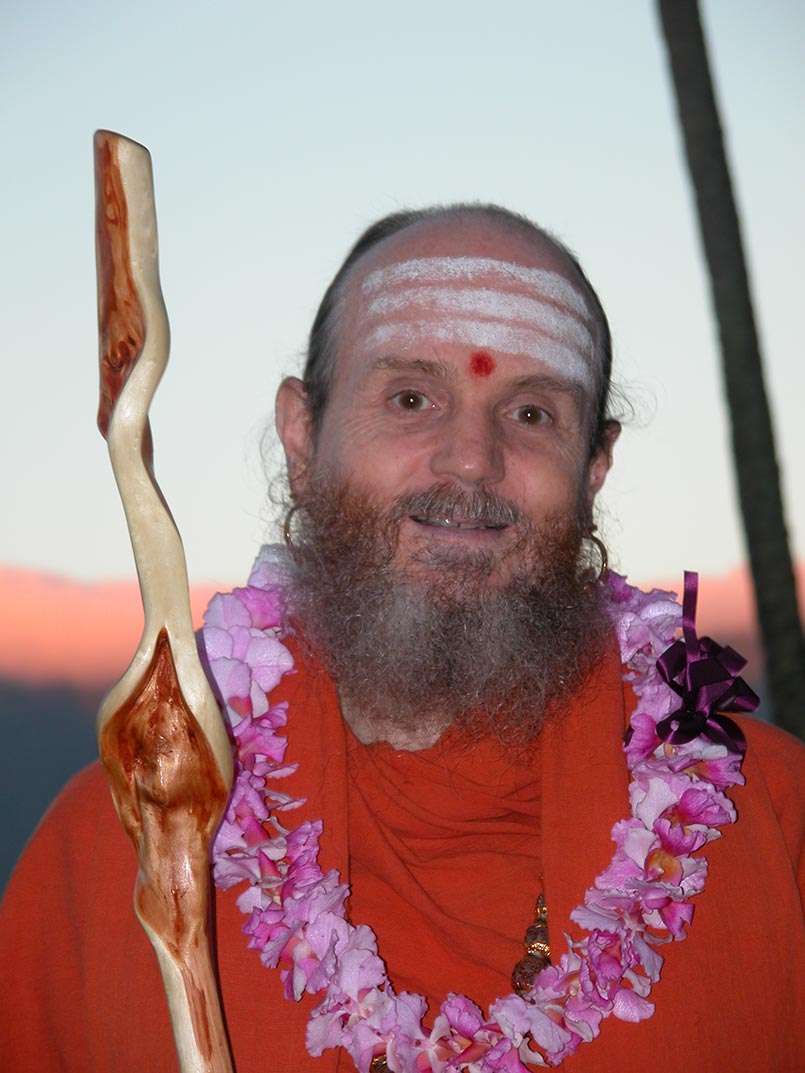
Bodhinatha's Latest Upadeshas - Commentaries on Path to Siva
What Is Our Code of Conduct - Yamas.
"Siva's devotees...move the forces of the world and are not moved or affected by them." We meet and interact with all kinds of people. If we're not following all the yamas it gets difficult to hold spirituality and to meditate. Actions which deviate from these ethical restraints cause disturbances in our life resulting in a disturbed mind, generating painful karmas.
Dhriti - Steadfastness, is very important. Gurudeva frequently talks about the 4 P's and then add "prayer": plan, persistence, push and start it all with prayer. Reach in and find your willpower.
Path to Siva, Lesson 40.
Click here to go to an index of all of Bodhinatha's and Gurudeva's online audio.
Why Is the Satguru So Important? Path to Siva Lesson 35
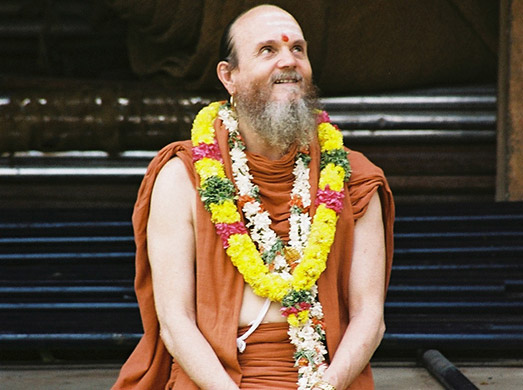
Bodhinatha's Latest Upadeshas - Commentaries on Path to Siva
Why Is the Satguru So Important? , Lesson 35 (November 19,2017) Also available in the SivaSiva App.
The satguru helps his devotees mover closer to God, deeper into themselves, into the sat, the real,the truth. Turn away from the world/asat--that which is not the truth, to find the truth/sat. Sat has no beginning and no end; it is eternal. The world is relatively real, it exists but is constantly changing. That which is absolutely real exists and is changeless. The satguru is trying to help you find that part of us that doesn't change/sat.
Path To Siva, Lesson 35.
Click here to go to an index of all of Bodhinatha's and Gurudeva's online audio.
Happy Pancha Ganapati – Day 4
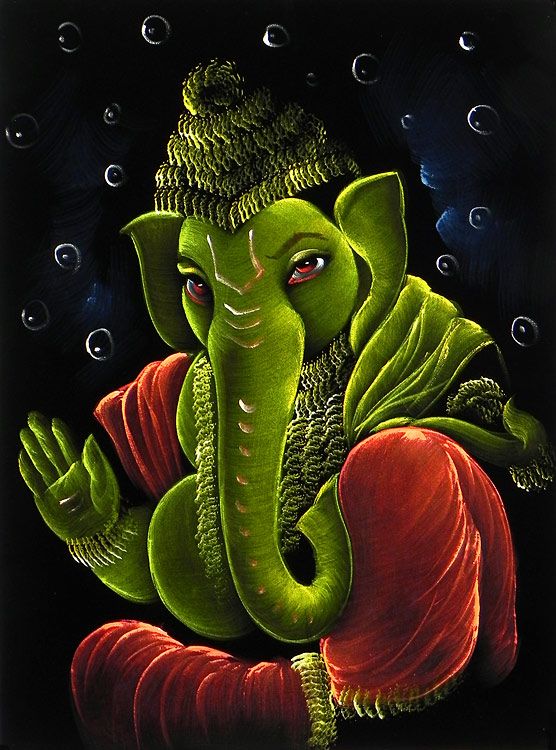 December 24, green: The sadhana of day four is to draw forth the vibration of
joy and harmony that comes from music, art, drama and the dance. Family, relatives
and friends gather for satsang to share and enjoy their artistic gifts. Then
all sit together before Ganesha, Patron of Arts and Guardian of Culture, discussing
Hindu Dharma and making plans to bring more cultural refinements into the
home. More gifts are placed before Pancha Ganapati.
December 24, green: The sadhana of day four is to draw forth the vibration of
joy and harmony that comes from music, art, drama and the dance. Family, relatives
and friends gather for satsang to share and enjoy their artistic gifts. Then
all sit together before Ganesha, Patron of Arts and Guardian of Culture, discussing
Hindu Dharma and making plans to bring more cultural refinements into the
home. More gifts are placed before Pancha Ganapati.
Professors & Students Visit the Garden
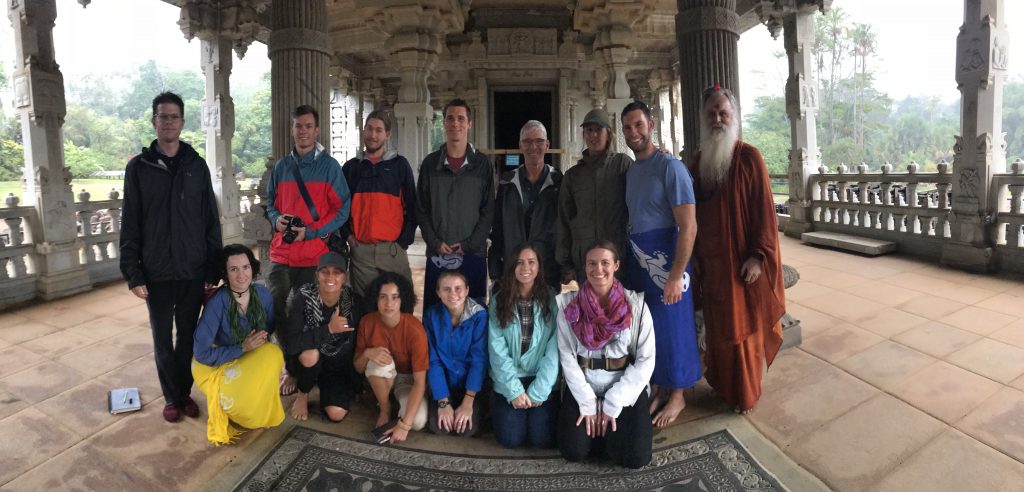 Sadasivanathaswami hosted a group of botany professors and students from the California Polytechnic State University (Cal Poly for short) a few days ago, as he does almost every year. They visit to learn about what kind of plants the monks are growing nowadays. There was lots of talk about plant and animal mitochondria. On their walkabout the students were stunned to see some of the wild, big-leafed creatures that live in Siva's sacred garden. They also shared lots of knowledge, visited Iraivan and got wet. Yes, it rained throughout their trek, but no one seemed to notice much. This photo was taken by Paramacharya and Matt Ritter, the leader. Swami started the pano and then Matt Ritter finished it as Swami took his place on the far right.
The university is organized into six colleges offering 64 bachelor's and 32 master's degrees. Cal Poly is known for it's "learn by doing" philosophy that encourages students to combine research theory with experiential practice to solve real-world problems. This practical philosophy, as well as a technical scientific education, enables Cal Poly to rank in the nation's top colleges for student's return on investment.
Sadasivanathaswami hosted a group of botany professors and students from the California Polytechnic State University (Cal Poly for short) a few days ago, as he does almost every year. They visit to learn about what kind of plants the monks are growing nowadays. There was lots of talk about plant and animal mitochondria. On their walkabout the students were stunned to see some of the wild, big-leafed creatures that live in Siva's sacred garden. They also shared lots of knowledge, visited Iraivan and got wet. Yes, it rained throughout their trek, but no one seemed to notice much. This photo was taken by Paramacharya and Matt Ritter, the leader. Swami started the pano and then Matt Ritter finished it as Swami took his place on the far right.
The university is organized into six colleges offering 64 bachelor's and 32 master's degrees. Cal Poly is known for it's "learn by doing" philosophy that encourages students to combine research theory with experiential practice to solve real-world problems. This practical philosophy, as well as a technical scientific education, enables Cal Poly to rank in the nation's top colleges for student's return on investment.
National Hindu Teenagers Conference, Kuala Lumpur
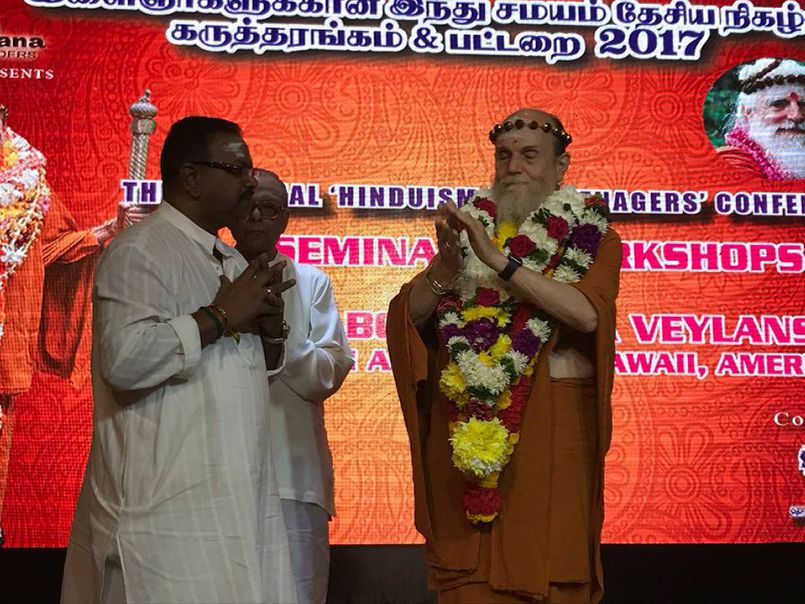
Kodiswara Rao reports:
HH Satguru Bodhinatha Veylanswami presided at The National Hinduism for Teenagers Conference, 2017, in Kuala Lumpur, Malaysia. This one day program was organized by Mr. Aravinthan Periasamy of Artha Nyana Concept Builders and was done with the support of the National Land and Finance Corporative Society (NLFCS), Malaysia, and co-organised by prominent Hindu organizations such as Malaysia Hindu Dharma Mamandram (MDHM), the Hindu Youth Organisation (HYO) and the Malaysia Hindu Sangam. The ex-president of MHS, Datuk Vaithilingam, in his speech, praised HH Satguru Bodhinatha Veylanswami's persistent educational efforts over the years, with the remark "This is the only Hindu institution that brings its teachings in various multimedia channels, making it very attractive." Satguru received the traditional honoring with huge, beautiful garlands from the heads of the co-organizers.
Satguru's presentation was about Hinduism and achieving spiritual progress. The teaching was precise and simple. The slides and animation components were very catchy. Not to forget Satguru's intermittent injection of Tamil readings excited the crowd. The famous Saint Yogaswami's quote "Bliss, bliss, bliss, here there and everywhere I am" had a spontaneous Tamil translation by Satguru, received applause from the crowd. Satguru's presentation was made up of independent topics thus it benefited the slowly-swelling-crowd, which was estimated at 550 in total. Each major parts were later translated to Tamil by the Kulapati of Saiva Siddhanta Mission, Ramesh Sivanathan, and the crowd was able to hear the message twice. The digital screen made for a grand display, enhancing the learning experience. The organizer was approached by youth leaders for their copy of Satguru's keynote presentation, which is underway.
While Satguru had taken a 3 hour break Mr. Wickneswaren Kaliaperumal took us back in time to the empire of Raja Raja Chola, his glory, accomplishments in South India and how the entire South East Asia up to Vietnam was brought under his Hindu kingdom. A great sense of pride was in the air!
At about 5:30pm, Satguru was again on stage, greeting and blessing each and every one of the conference attendees with his unfailing loving grace. Attendees from all over the Peninsular Malaysia had patiently waited for blessings. We felt the satisfaction and happiness of having attended a great teaching program in the proximity of the Holy Teacher. We recall a MHDM personnel saying, "We would love to have more presentations in the future, an absolute need for us."
Character Building Workbook Series: Appreciation
 Appreciation or gratitude is a sign of spiritual progress, and the joy it brings to our life make it worthy of nurturing. In order to begin to apply this character trait we must first become observant of life around us and aware of its subtle nature. Satguru Sivaya Subramuniyaswami had the insight that observation is the first awakening of the soul and that becomes clear the more this teaching is internalized.
Appreciation or gratitude is a sign of spiritual progress, and the joy it brings to our life make it worthy of nurturing. In order to begin to apply this character trait we must first become observant of life around us and aware of its subtle nature. Satguru Sivaya Subramuniyaswami had the insight that observation is the first awakening of the soul and that becomes clear the more this teaching is internalized.
Where do we begin? How can one develop a sense of appreciation through observation? We need a new paradigm, or worldview, and we need a new road map. Take yourself out of the equation for just a few minutes. Just like we detached from emotion with the other character traits, we need to practice detachment from "me" and "mine" in order to see just how perfect everything is around us. Regardless of how successful or poor at something you are, the sun still came up today. Even though you handled something stressful last week, all of nature continued on its own—trees battled wind and stood their ground, red ant colonies continued their ongoing wars with black ant colonies, the entire universe expanded at a rate that our minds cannot even begin to conceive. While you were wrapped up in the microcosm of life, the galaxy, the earth, the sun and the moon all continued their marvelous—Siva's dance. His majestic dance goes on, yet most people don't give it a thought. But they can tell you if gas prices rose a little today.
Once we begin to let go of the idea that we alone exist, our behavior can encompass other people's concerns—just as if they were our own. Our identity expands, our sensibilities become more refined. Living this way can certainly make us more vulnerable, but if we are stable in our sadhana and living dharmicly we will have the strength to face all that comes our way.
Becoming aware of our surroundings via affectionate detachment is a good start. Instead of complaining or worrying about the negative aspects of your current situation, of which there are going to be some, shift your perspective and be thankful for everything you have gotten from your karma in this life. This becomes an easy practice when you remember how badly others have it compared to you. Remember how just being ill makes you yearn to just be normal again? You are easily able to switch paradigms by being detached from good health and appreciation becomes quite easy. Without getting sick, detach from your situation and appreciate how things could be more difficult.
Gurudeva sums up this trait by saying, “Appreciation is a beautiful, soulful quality available to everyone in every circumstance—being thankful for life’s little treasures, grateful for the opportunity to begin the day where you are, appreciating the perfect place your karma and God’s grace have brought you to. Appreciation is life-giving. Loving appreciation is a life-changing force just waiting to be used. Express appreciation to community leaders, business associates, spiritual mentors, family members and friends as often as you can. Loving appreciation is a magic formula that works both ways. When we commend another, we are automatically uplifted.”
Practice:
For the week ahead, when outside the home be observant of the details of your surroundings. When you encounter something exceptional, focus on it and appreciate its uniqueness.
Character Building Workbook Series: Affection
Over the weekend and into next week we are going to think about affection, the third character trait in our Character Building Workbook Series.

affection | əˈfekSH(ə)n |
noun
1 a gentle feeling of fondness or liking
• physical expressions of affection
2
• a mental state; an emotion.
Synonyms: fondness, love, liking, tenderness, warmth, devotion, endearment, care, caring, attachment, friendship
Expressing affection is not something that comes naturally to everyone. Whether we are too young and lack experience or emotional trauma in our past has blocked our ability or desire to show affection, most of us have to work on our affectionate nature and learn how to express it in a healthy way.
Showing affection does not have to include hugging every person you meet (that might not work well). Instead, try expressing this loving trait with understanding and practicing empathy—the ability to understand and share the feelings of another. Empathy will naturally lead us into affection and care since we can start to relate to another person, their current problems or their perspective on a given subject. Essentially, when we empathize we open up and begin to trust others. Feeling vulnerable with openness and having trust issues might be a signpost that we need to resolve something in our past.

Practice:
Try to resolve past issues by writing them down on paper and burning the paper in a safe area using a metal trash can or cement fire pit. Gurudeva's Vasana Daha Tantra is meant for anyone needing to release the sticky negative emotion that lingers in the sub of the subconscious mind.
An endearing or affectionate nature requires balance, and with training affection can be turned on when needed and muted when that is more appropriate. Sometimes the most effective way to show affection is just by smiling. Go ahead and start with family and friends, as that will be the easiest way to determine if you have a strong bond of closeness and understanding with people you were raised with. Spend quality time with family when you don't have to, read body language to assess when someone is needing more affection and express love by offering to support their endeavors.
Observe your state of mind around others. Do you reach actual eye contact during a conversation? Or are you multi-tasking and looking at your phone? Give the person speaking your full attention and give them what's called psychological air. In this simple act you are saying with your body language, "You matter to me." They can relax around you because they know you care about what they are going through and that you will love them, not judge them. Sometimes in a stressful situation that's all people are looking for. Once we feel that we matter to someone else, we can release a great deal of tension and let down barriers of anxiety and finally relax around people we care about—it's not always enough to know affection is already there, we need to express it. *On an admin note, we are currently having trouble with the blog's commenting system and everything should be running smoothly in a few days."You learn to speak by speaking, to study by studying, to run by running, to work by working; in just the same way, you learn to love by loving." Anatole France
The Brihadaranyaka Upanishad
 "Maitreyi,” said Yajnavalkya, “I am about to go forth from this state. Come, let me make a final settlement between you and Katyayani.” "My lord," said Maitreyi, "if all the world's wealth were mine, would I be immortal through those means?" "No," replied Yajnavalkya, "Your life would be the same as that of the rich. Of immortality, however, there is no hope through wealth." Maitreyi then asked, "Of what use then are money and material possessions to me? Please tell me, bhagavan, of the way that leads to immortality."
"Ah, Maitreyi, you have always been dear to me, even more now that you have asked me about immortality. Come, sit down, I will explain to you. Reflect deeply on what I say."
...The final article will be published in the months ahead
"Maitreyi,” said Yajnavalkya, “I am about to go forth from this state. Come, let me make a final settlement between you and Katyayani.” "My lord," said Maitreyi, "if all the world's wealth were mine, would I be immortal through those means?" "No," replied Yajnavalkya, "Your life would be the same as that of the rich. Of immortality, however, there is no hope through wealth." Maitreyi then asked, "Of what use then are money and material possessions to me? Please tell me, bhagavan, of the way that leads to immortality."
"Ah, Maitreyi, you have always been dear to me, even more now that you have asked me about immortality. Come, sit down, I will explain to you. Reflect deeply on what I say."
...The final article will be published in the months ahead
Character Building Workbook Series: Acceptance

Acceptance.
acceptance | kseptns |
noun
1 the action of consenting to receive or undertake something offered:
2 the action or process of being received as adequate or suitable, typically to be admitted into a group
3 agreement with or belief in an idea, opinion, or explanation
willingness to tolerate a difficult or unpleasant situation
This week we are going to focus on the Character Workbooks's second trait: Acceptance. We all know what it is to accept something physical like a gift or a handshake. Acceptance gets a little more complex when something unpleasant happens to us. At work we can receive a correction and hopefully accept it. Everyday we get thousands of inputs to our senses and sent into our brain that we more or less just accept. Acceptance is a part of our reality whether we cognize it or not. So what's there to talk about? Today's blog post is going to define how to accept that which we don't prefer.
Detach and Surrender
When we are confronted with difficult experiences we have to keep detachment and surrender in mind or else we are going to attach and hold on to them, thus making our sadhana that much more difficult. There is a letting go that occurs when awareness has a chance to put reason and logic in front of emotion and accept what is happening.
 Ever notice how we can easily let small things in life go? Let's say someone spills a drink in the kitchen and your first reaction is to grab a towel and help clean it up, easy right? That experience doesn't really go through your mind all day and night because you were detached. In a sense, you were able to set emotion aside and logically mend the situation based on past experience. We've all spilled something before and after a while we develop a habit of cleaning those situations up. It's the situations in life that we aren't secure in that really cause us grief, and when a solution isn't immediately obvious we can react with emotion--often making the situation worse. Acceptance isn't really possible when ego takes over and demands attention. In a way our frustration and anger are saying, "This shouldn't be happening, at least not to me."
Ever notice how we can easily let small things in life go? Let's say someone spills a drink in the kitchen and your first reaction is to grab a towel and help clean it up, easy right? That experience doesn't really go through your mind all day and night because you were detached. In a sense, you were able to set emotion aside and logically mend the situation based on past experience. We've all spilled something before and after a while we develop a habit of cleaning those situations up. It's the situations in life that we aren't secure in that really cause us grief, and when a solution isn't immediately obvious we can react with emotion--often making the situation worse. Acceptance isn't really possible when ego takes over and demands attention. In a way our frustration and anger are saying, "This shouldn't be happening, at least not to me."
Clinging to ego with emotion is fuel for the fire. Our basic wish to be respected can take any situation out of control, often upsetting the other person--who isn't thinking at all about your self-worth. Miscommunication breeds misunderstanding and a race to see who can dominate takes us out of being two-thirds within and into the toil of our lower nature. Encounter this enough times with the same person and trust is broken down to catastrophic levels.
Let's put things in perspective and change the way we react to hardship: Own it.
Embracing Stress Through Ownership
To detach in the heat of the moment not only takes intellectual understanding and practice, but it requires a new paradigm of ownership for everything that happens to us. If it is our karma getting dealt then so be it. Once we take ownership of a situation we can then take responsibility and find a solution. Until that happens it's the other person's fault and nothing gets resolved.

But what if we surrendered to what is happening and accepted it as our karma? Or even better, what if we could look forward to challenges knowing that it progresses our souls evolution? Breathe. When we breathe deeply we get a chance to center ourselves. Stepping back for a moment and breathing can let your emotion subside just long enough tp bring you up into reason and logic. It's not enough to know the teachings and understand how karma works, we have to practice in-the-moment detachment in order to get better at handling stress. Notice that's not dealing with stress but handling it. Anytime we feel like we have to deal with something we aren't really accepting it fully. Dealing with stress isn't the same as handling it effectively.
The Week Ahead
For this week, when experiencing situations that do not work out as you had hoped, step back, breathe and detach in order to let go of your expectations and accept the actual outcome. Own up to it, be responsible and start producing a solution instead of blaming others.
Comment below with your commitment for accepting what happens this week!
From Our Gurus' Teachings
Archives are now available through 2001. Light colored days have no posts. 1998-2001 coming later.
